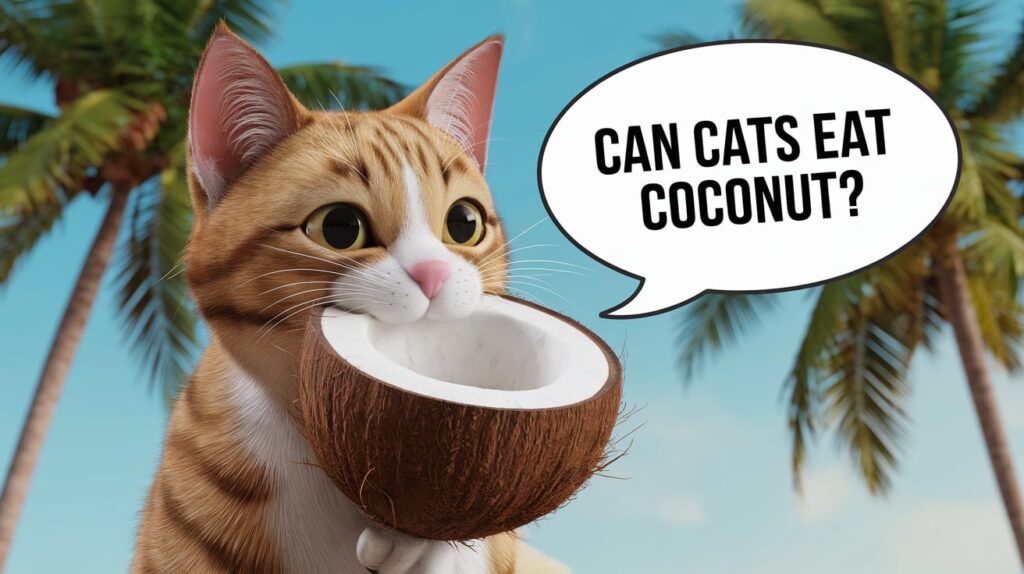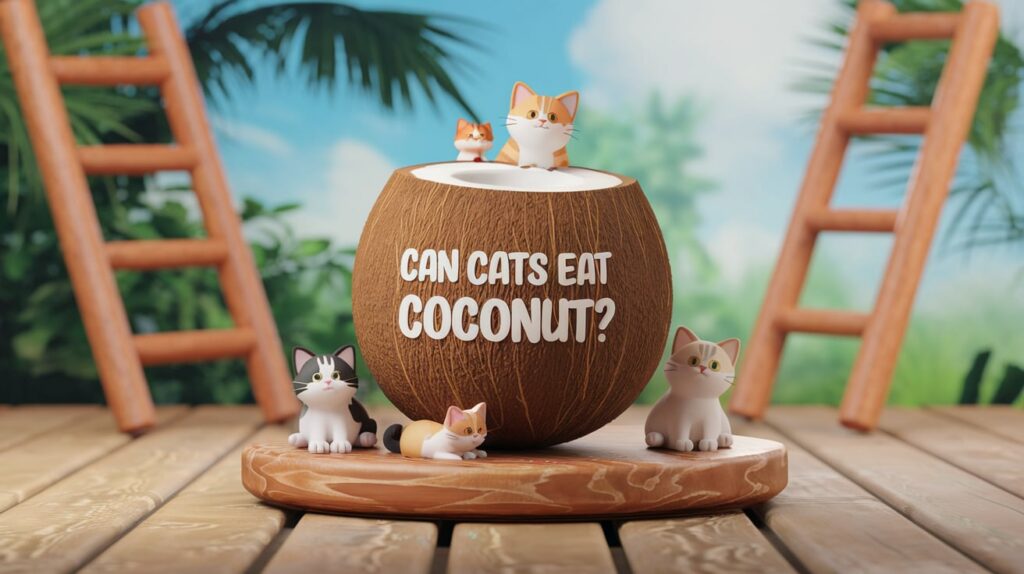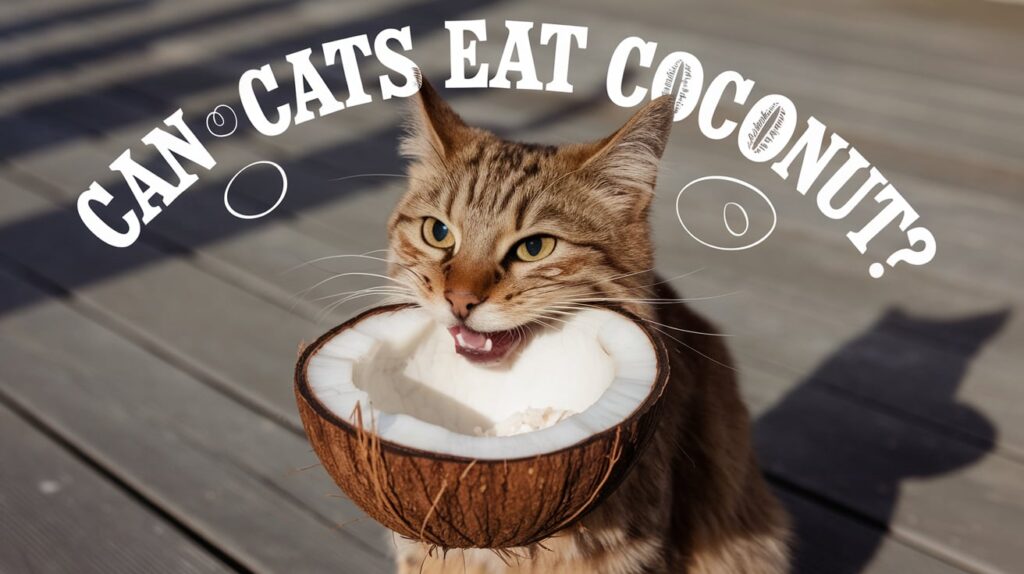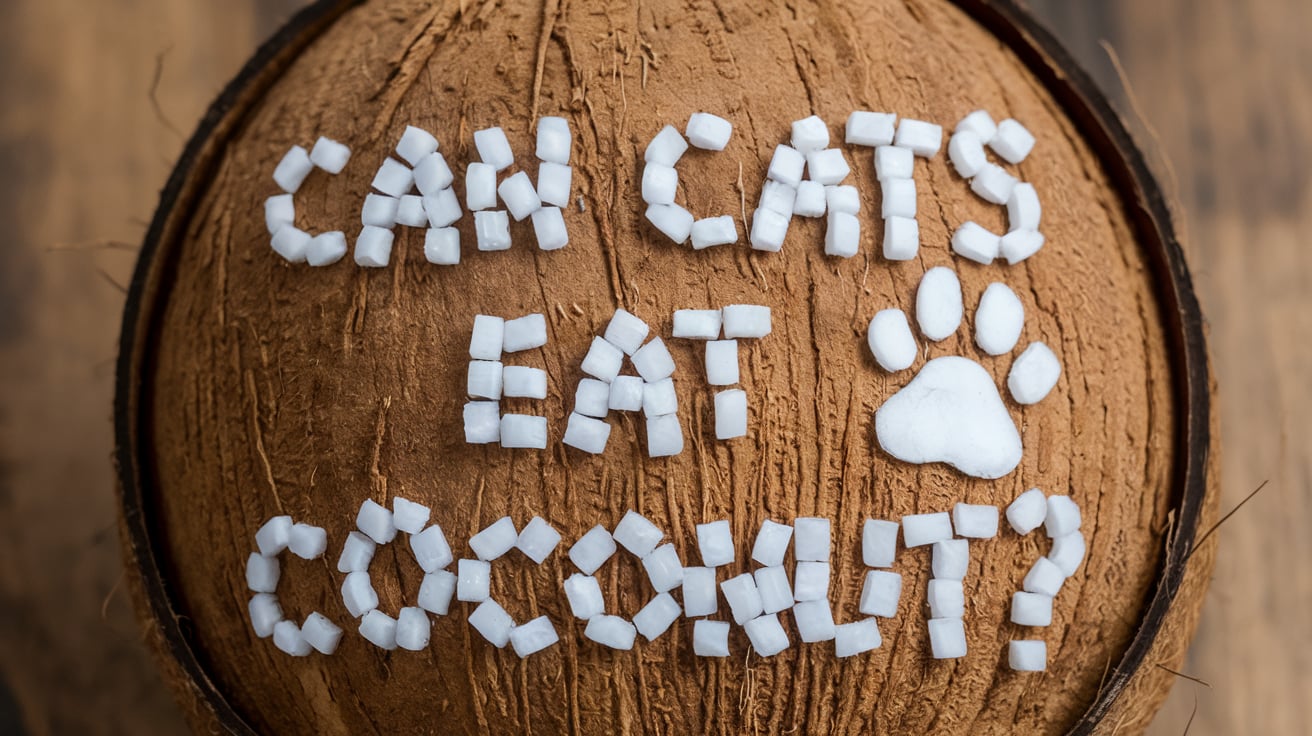Table of Contents
ToggleCan Cats Eat Coconut? Understanding Coconut’s Impact on Your Feline Friend
Coconut has gained popularity as a superfood in recent years, with many people incorporating it into their diets for its numerous health benefits. But if you’re a cat owner, you may wonder, “Can cats eat coconut?” This article will dive into the topic and explore whether coconut is safe for your feline friend, what benefits or risks it may present, and how to incorporate it into their diet safely—if at all.
What is Coconut?
Before answering the question, “Can cats eat coconut?”, it’s important to understand what coconut is. Coconuts are fruits from the coconut palm tree. They consist of a hard shell, coconut water inside, and the white, fleshy part we eat, known as coconut meat. They can be eaten raw, dried, or processed into coconut milk, oil, or flour.
Coconut: A Nutritional Breakdown

Coconut is rich in fiber, healthy fats, and certain vitamins, such as vitamins C and E. However, while these nutrients are great for humans, they don’t hold the same value for cats. Cats don’t need high amounts of fiber, and their digestive systems are not designed to process plant-based fats in the way humans can.
Key Nutrients in Coconut:
- Fiber: Helps in digestion but is not a primary need for cats.
- Healthy Fats: These include medium-chain triglycerides (MCTs), which can boost energy but are not required in large quantities by cats.
- Vitamins: While vitamins like C and E are beneficial, they are not as essential for cats as they are for humans, and a balanced cat diet provides these vitamins in the necessary amounts.
The Benefits of Coconut for Cats
While coconut isn’t necessary for a cat’s diet, there may be some mild benefits if offered occasionally and in moderation. Let’s explore how coconut can affect your cat:
1. Hydration
Coconut water, which is the clear liquid found inside the coconut, can be hydrating due to its high electrolyte content. If your cat is dehydrated or has lost fluids due to illness, a small amount of coconut water could help replenish them. However, always consult a vet before introducing new fluids.
2. Energy Boost
The fats found in coconut, specifically medium-chain triglycerides (MCTs), are a quick source of energy. Some pet owners have reported that their cats seem more energetic after consuming small amounts of coconut oil. But keep in mind, that cats do not need excessive fats in their diets.
Potential Risks of Feeding Coconut to Cats

Even though cats can eat coconut, that doesn’t mean it’s always a good idea. There are some potential risks associated with feeding coconut to your feline friend, which you should be aware of.
1. Digestive Issues
Coconut is high in fats and fiber, which may not sit well with a cat’s digestive system. Large amounts can lead to upset stomachs, diarrhea, and vomiting. Since cats have sensitive stomachs when it comes to non-meat foods, introducing too much coconut can easily cause these digestive problems.
2. Weight Gain
Since coconut is calorie-dense due to its high-fat content, overfeeding coconut to your cat could lead to unhealthy weight gain. Obesity is a serious health risk for cats and can lead to diabetes, heart problems, and reduced mobility.
3. Allergies
Although rare, cats can develop allergic reactions to certain foods, including coconut. If you notice your cat scratching excessively, having trouble breathing, or experiencing any other signs of an allergic reaction after eating coconut, stop feeding it immediately and consult your vet.
Different Forms of Coconut: Which Are Safe for Cats?
Now that we’ve answered the question, “Can cats eat coconut?”, it’s crucial to explore the various forms of coconut and whether they are safe for cats to consume.
1. Raw Coconut Meat
Cats can safely eat small amounts of raw coconut meat. However, as mentioned earlier, it should only be offered occasionally and in moderation to avoid digestive upset.
2. Coconut Oil
Coconut oil has become popular as a supplement for cats, as some believe it promotes a healthy coat and skin. A small amount of coconut oil is generally safe, but again, it should only be used occasionally. Overuse can lead to weight gain and an imbalance in your cat’s diet.
3. Coconut Water
Coconut water is safe for cats to drink in small quantities. Due to its electrolyte content, it can be a beneficial drink for a dehydrated cat, but it should never replace their regular water intake.
4. Dried Coconut
Dried coconut is not recommended for cats. It is often processed with added sugars or preservatives, which can be harmful to your cat. Additionally, dried coconut can be difficult for cats to digest.
How to Introduce Coconut to Your Cat’s Diet Safely
If you’ve decided to give your cat coconut, it’s important to introduce it gradually and in small amounts. Monitor your cat for any signs of digestive distress, allergic reactions, or changes in behavior. Here are a few tips:
- Start Small: Give your cat a tiny piece of coconut meat or a teaspoon of coconut oil. Observe how they react before offering more.
- Monitor for Reactions: Look for signs of stomach upset, diarrhea, or any allergic reactions.
- Limit Frequency: Coconut should only be given as an occasional treat and not as a regular part of your cat’s diet.
- Consult Your Vet: If you’re unsure whether coconut is suitable for your cat, it’s always best to consult with your vet before making any changes to their diet.

Coconut Alternatives for Cats
If you want to treat your cat but are unsure about “Can cats eat coconut?”, there are plenty of other safe alternatives. Here are a few cat-friendly snacks:
1. Cooked Meat
Since cats are obligate carnivores, they thrive on meat. Cooked chicken, turkey, or lean beef are great treats for your cat. Just make sure it’s unseasoned and fully cooked.
2. Fish
Small amounts of cooked fish, like salmon or tuna, can also be a tasty treat for your cat. Be careful not to overfeed fish, as too much can lead to mercury poisoning.
3. Cat-Specific Treats
There are many treats specifically designed for cats that meet their nutritional needs. Opt for high-quality treats that are made from real meat and avoid those with artificial ingredients or fillers.
Conclusion:
To summarize, cats can eat coconut, but only in small amounts and on rare occasions. Coconut is not toxic to cats, but it doesn’t provide the nutrients they need to stay healthy, and too much of it could lead to digestive issues or weight gain. If you choose to introduce coconut to your cat’s diet, do so cautiously, and always prioritize foods that align with their carnivorous nature.
FAQs: Can Cats Eat Coconut?
- Are coconuts safe for cats?
Yes, coconuts are generally safe for cats in small amounts, but too much can cause digestive issues like diarrhea or vomiting. - Why do cats love coconut?
Cats may be attracted to the smell or taste of coconut due to its sweetness, but it doesn’t provide the essential nutrients they need. - Can cats eat pineapple or coconut?
Cats can eat small amounts of both pineapple and coconut, but neither should be a regular part of their diet as they are not nutritionally necessary. - Can I give my cat coconut water?
Yes, coconut water is safe in small amounts and may help with hydration, but it should not replace regular water.
RELATED ARTICLE:
Can I Put Coconut Oil on My Cats Bum?

Welcome to Hypocats.com! I’m Khawar Akhtar, a passionate writer dedicated to all things feline. With a deep love for cats and a keen interest in their health, diet, and training, I strive to provide cat owners with valuable insights and practical advice to enhance their furry friends’ well-being. My goal is to share my expertise and enthusiasm for our whiskered companions, helping them lead happier, healthier lives. When I’m not writing, you’ll find me spending quality time with my Russian Blue cat, enjoying the simple joys that come with being a cat lover. Thank you for visiting Hypocats.com—I hope you find the information here as helpful and inspiring as I do!


Leave a Reply